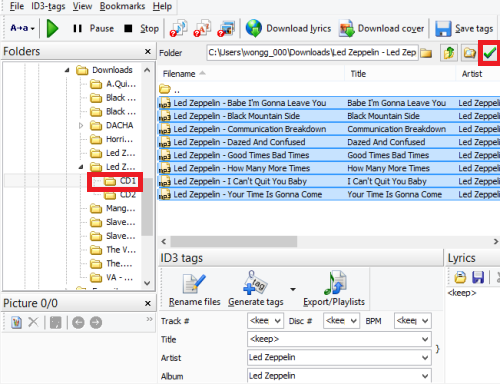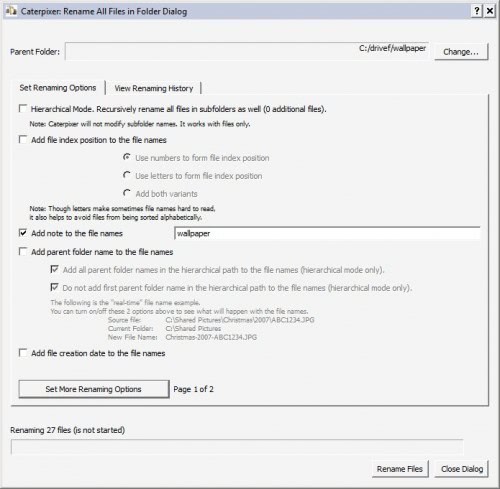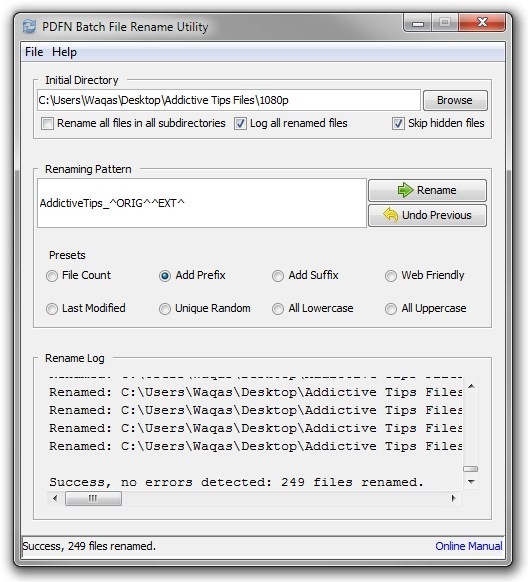

- #Batch file rename files in subfolders how to
- #Batch file rename files in subfolders full
- #Batch file rename files in subfolders windows
To rename extensions of all file in a folder, you can use this PowerShell command: Get-ChildItem *.jpeg | Rename-Item -newname
#Batch file rename files in subfolders windows
To recursively rename extensions in all sub-folders you can use this command: forfiles /S /M *.jpeg /C "cmd /c rename File Extensions Using Windows PowerShell Rename all file extensions in a folder and its sub-folders.To do that, have a look at the next command. So if you wanted to rename extensions of files in sub-folders as well, this wouldn’t do. This command works only in the directory you’re in. You can do that with this command: rename *.jpeg *.jpgĪnd you’re done. This script uses the Get-ChildItem cmdlet to get all files in the specified folder. For example, say you have a folder with 100s of jpeg files, and you want to rename them to. Batch renaming files by Adding Prefixes or Suffixes with PowerShell scripts.

To rename all file extension in a folder we can just use the rename command. Rename File Extensions Using Command Prompt We’re going to do this using the built-in Command Prompt and Windows PowerShell.
#Batch file rename files in subfolders how to
**/*Vol_*.In this post I will show you how to rename file extensions in Windows from the command line. Would expand to all those names in numerical order (and recursively down int subdirectories): $ print -rC1. If you use GNU tools, you may also want to use mv -b to make backups of files if there are name collisions.Īs a side note, in the zsh shell, the globbing pattern. You should run this once an see that the output is correct first. Well, I've commented out the actual mv command for safety. It then does the same operations as we did before to arrive at a new name, which gets stored in newname, and then it renames the file. The script loops over these pathnames and pulls out the filename into name and the directory pathname into dirpath. The inline bash -c script here gets called by find with batches of found pathnames that fulfill the -type f (is a regular file) and -name (has a particular name) criteria. Printf "Would rename %s -> %s\n" "$pathname" "$dirpath/$newname" I am in the process of writing a batch file that can quickly run through a root folder, Well just say 'C:SomeMusic' that has a lot of subfolders and files in it. iname "*.nii" -execdir rename Vol_ Vol_0 *Vol_.nii '" "$number" nii files in the relevant subfolders, and then do a batch renaming: find. It seems like there is some kind of weird loop going on with the expression (it tries to change the new Vol_01, giving the error message)? And why is it not adding an zero to the two/three digits?Ģ. FOR executes for each file the executable D:\Test.
#Batch file rename files in subfolders full
The name of each found file is assigned with full path to case-sensitive loop variable I. The command FOR searches recursive in directory D:\Test and all subdirectories for files matching the wildcard pattern. However, it does not add a zero to any number which already has two or three digits: swu_run1_P_277_Vol_1.txt -> swu_run1_P_277_Vol_01.nii Strangely enough, it is adding the zero to Vol_1-9. If I run this in a subfolder, I get the following error message: Error: rename: swu_run1_P_275_Vol_1.nii: rename to swu_run1_P_275_Vol_01.nii failed: No such file or directory The solution: Get the filename. Your filename is a full path when you use /R. Syntax: REN drive: pathfilename1 filename2. Rename multiple filesnames, adding zeroes to the middle of the filename: rename Vol_ Vol_0 *Vol_.nii The reason: ren destination is the filename only - no path. I have little experience with unix/linux systems, but using previous threads, I managed to come up with the following code.

One way to solve this, is to add zeroes to the filename and make everything three digits, e.g: swu_run1_P_277_Vol_1.nii -> swu_run1_P_277_Vol_001.nii Bridge can show all files from all sub folders, which helps with selecting all required files for batch renaming in a single pass. Vol_# ranges from 1 till 405 (volume number)Īs the volume ranges from 1 till 405, it means that any list starts with 100, rather than going 1-405 (e.g.P_# ranges from P76 to P277 (participant number).To be more specific, I have 130+ folders with 400+. More specifically, I would like to add zeroes to the middle of the filename, so that all filenames have three digits (and therefore show up in a logical order). I would like to rename multiple files that are located in different folders.


 0 kommentar(er)
0 kommentar(er)
